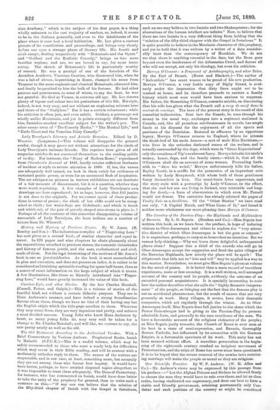Mervyn O'Connor : a Fragment of Autobiography, and other Tales.
By the Earl of Desert. (Hurst and Blackett.)—The author of " Kelverdale " has scant reason to be proud of his new production. Mervyn O'Connor, a very feeble copy of Digby Grand, is evid- ently under the impression that dirty linen ought not to be washed at home, and he therefore proceeds to narrate a family history which most sons would have been anxious to suppress. His father, Sir Something O'Connor, commits suicide, on discovering that his wife has given what the French call a coup de eanif dans is confrat de mariage. The hero of the present story is the result of this connubial indiscretion. Sent into the Guards, he runs through his money in the usual way, exchanges into a regiment stationed ic Canada, and, like all penniless sub-lieutenants in novels, has ample- funds at his disposal for the enjoyment of all the sports and pastimes of the Dominion. Restored to affluence by an opportune legacy, Mervyn O'Connor returns to England, where he attends the death-bed of his uncle James—a sort of male Miss Havisham,— who lives in the orthodox darkened rooms of the recluse, and is actually surrounded by the dogs, which were in " Great Expectations' only the creations of Pip's exuberant fancy. Mervyn inherits his uncle's money, house, dogs, and the family curse,—which is, that all the O'Connors shall die on account of some woman. Proceeding forth- with to " dree his weird," Mervyn unfortunately kills his father, Bayley North, in a scuffle for the possession of an imprudent note written by Lady Monymusk, with whom both of these gentlemen fancy themselves in love. The usual-brain fever supervenes, and the story ends with a postscript by Lady O'Connor, to the effect, that she and her son are living in Ireland, very miserable and long- ing for death,—a form of absenteeism to which even Mr. Parnell would not demur. The narrative has already adorned the pages of Vanity Fair as a feuilleton. Of the "Other Stories" we have read one only, "A Capital Match, and What Came of It," and found it neither more wholesome nor more pleasing than Mervyn O'Connor.


































 Previous page
Previous page